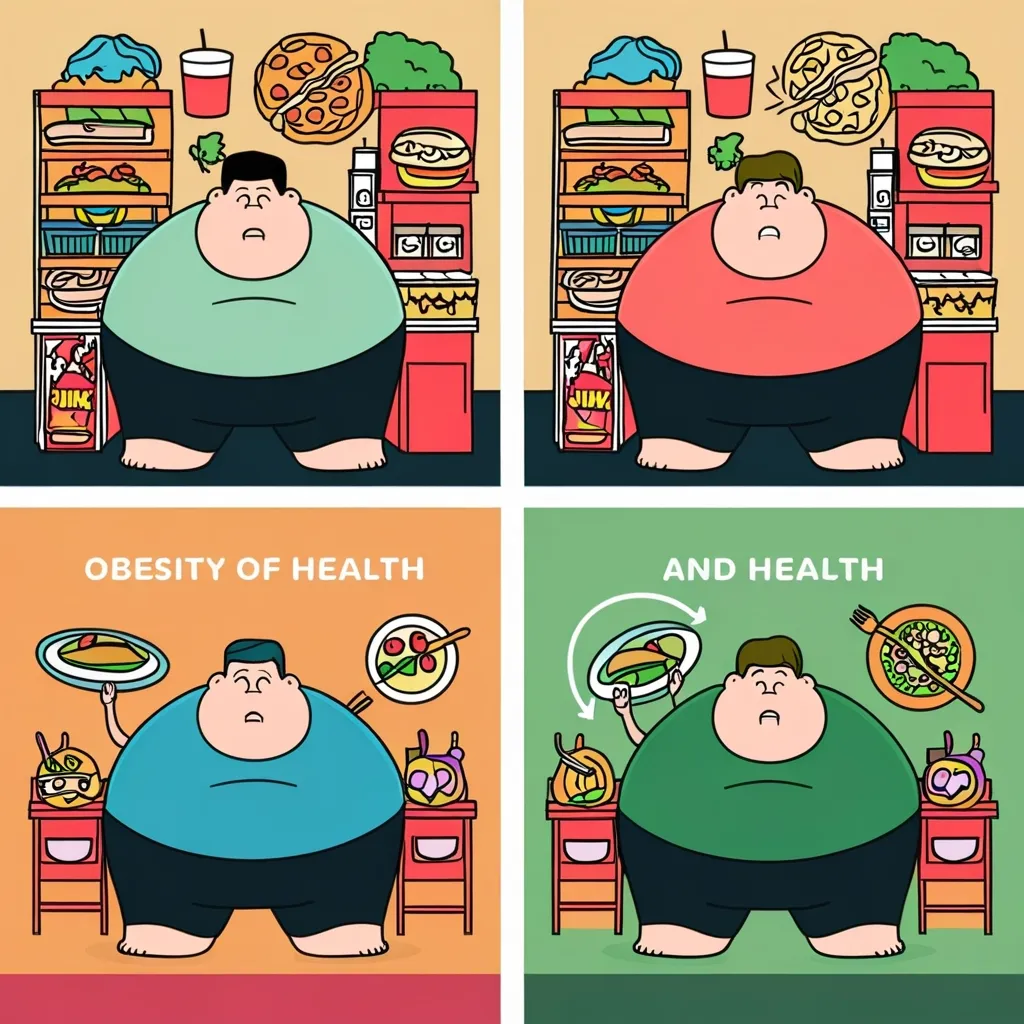Obesity is a big deal and affects millions worldwide in so many ways. It’s not just about carrying extra weight; it goes deeper, impacting overall health. There’s so much to know about why it happens, how it shows up, and what can be done about it.
At the heart of it, obesity often boils down to a simple math problem: more calories are going in than going out. This can be due to various reasons, from eating the wrong kinds of food to not moving enough.
A major culprit is a poor diet. Think junk food, sugary drinks, and processed stuff. These are delicious but usually packed with fats, sugars, and salt while lacking essential nutrients. Regularly munching on these can overload the body with calories, even though they don’t offer much in terms of nutritional value.
On top of that, inactivity plays a huge role. Modern life makes it easy to be lazy. Long hours sitting at a desk, binge-watching shows, or just not having time to work out means calories aren’t getting burned off. This, paired with a high-calorie diet, spells trouble.
When obesity starts to creep in, it shows itself in a few ways. The most noticeable is weight gain, especially around the waist. There’s a tool for measuring this called the body mass index (BMI). A BMI of 30 or above flags obesity.
Another common feeling is fatigue. Carrying extra weight means the body has to work harder to do everyday tasks, which can be exhausting. This tiredness can also tie back to other health issues common in those struggling with obesity, like sleep apnea and joint pain.
Then there are other physical and emotional signs. Back pain, heavy sweating, and finding it tricky to do physical tasks are common. Obesity can mess with your head too, leading to depression, anxiety, and a hit to self-esteem.
Obesity isn’t just about looking good; it’s seriously about feeling good too. It hikes the risk of heart disease and stroke because it messes with blood pressure and cholesterol levels. Those conditions can pave the way for heart attacks and strokes.
Type 2 diabetes is another concern. Being overweight can make it tougher for the body to use insulin properly, leading to insulin resistance. This condition demands constant management and can complicate life further.
There’s also a connection between obesity and certain cancers. This includes cancers of the uterus, cervix, endometrium, and breast, as well as the colon, rectum, esophagus, liver, gallbladder, pancreas, kidney, and prostate.
Digestive issues can crop up too. Problems like heartburn, gallbladder disease, and liver issues can make life miserable and may need medical help.
When it comes to tackling obesity, the approach needs to be a mix of different strategies, from changing what you eat to moving more and sometimes turning to medical help.
The first step is to eat better. The main goal is cutting down on junk food, sugary drinks, and processed foods. Instead, fill up on fruits, veggies, whole grains, and lean proteins. Eating a bunch of veggies and lean proteins can make you feel full with less food.
Getting active is just as important. Exercising regularly helps burn off those extra calories and keeps the weight in check. Activities like walking, running, swimming, or even strength training can do wonders. Small changes, like walking up the stairs instead of using the elevator or parking farther from the entrance, can add up.
Changing behavior is key for long-term success. This might mean talking to a counselor or joining a support group. It’s all about recognizing and altering the habits that led to the weight gain in the first place, like binge eating or leading a sedentary lifestyle.
For some, medical interventions can be the way to go. This could be prescription medication for weight loss or, in more severe cases, bariatric surgery. These options should always be pursued under a doc’s guidance and as part of an overall weight-loss plan.
Preventing obesity is definitely easier than treating it. Healthy eating habits are a must. Avoid situations where you might find yourself overeating, like eating in front of the TV or skipping meals and then going overboard later. Keeping an eye on your weight and staying consistent with healthy eating can keep you on the right track.
Regular exercise is a game-changer when it comes to burning calories and keeping weight off. Aim to get at least 150 minutes of moderate-intensity aerobic activity or 75 minutes of vigorous-intensity aerobic activity each week, along with muscle-strengthening activities.
Lifestyle changes can hugely cut down the risk of obesity. Ditching sedentary habits, getting enough sleep, and managing stress are all crucial. Lack of sleep and constant stress can both lead to weight gain.
In short, obesity is a serious issue that needs a multi-faceted approach to handle. By understanding why it happens, recognizing the signs, and knowing how to treat it, we can take the right steps to stay healthy. This means eating well, working out regularly, and making smarter lifestyle choices. Although obesity can be treated, preventing it by sticking to healthy habits is always the best route. Working together, we can promote healthier lifestyles and cut down on the complications that come with obesity.






